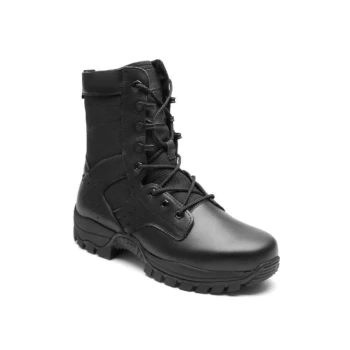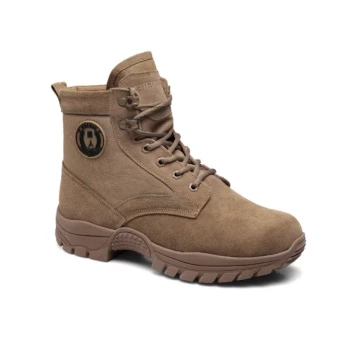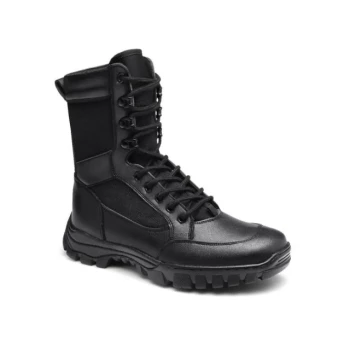The two primary materials used to make wellington boots are natural rubber and polyvinyl chloride (PVC). These materials are chosen for their excellent waterproof properties, durability, and flexibility, making them ideal for protective, all-weather footwear. While other materials like leather and composites are used in various types of work boots, rubber and PVC dominate the traditional wellington boot market.
The choice between rubber and PVC is not just about preference; it's a fundamental decision that dictates the boot's performance, durability, comfort, and cost. Understanding this trade-off is the key to selecting the right boot for your specific needs.
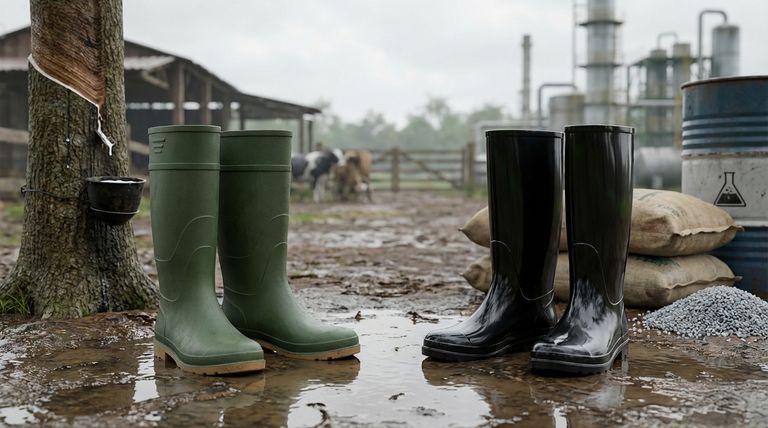
Why Rubber and PVC Dominate Wellington Boot Manufacturing
The core function of a wellington boot is to keep the wearer's feet dry and protected. Both natural rubber and PVC excel at this primary task, but they achieve it through different material properties, leading to distinct advantages in different scenarios.
Natural Rubber: The Traditional Standard
Natural rubber is the classic material for wellington boots, valued for its superior flexibility and comfort.
It is sourced from the latex of rubber trees, a sustainable resource. This natural origin gives it an elastic quality that synthetic materials struggle to replicate perfectly.
This elasticity allows the boot to move more naturally with your foot, reducing fatigue over long periods of wear. It also offers better performance in cold temperatures, as it is less likely to become stiff and crack.
PVC (Polyvinyl Chloride): The Synthetic Alternative
PVC is a type of plastic, a synthetic polymer that is manufactured through a chemical process. It is also referred to as vinyl.
The primary advantage of PVC is its lower production cost and high resistance to chemicals, acids, and oils. This makes PVC wellingtons a popular choice for industrial, agricultural, and chemical-handling environments.
While generally stiffer than natural rubber, modern manufacturing has improved the flexibility of PVC boots considerably.
Understanding the Trade-offs
Choosing between rubber and PVC involves balancing cost, comfort, and specialized performance. Neither material is universally superior; the right choice depends entirely on the intended use.
Flexibility and Comfort
Natural rubber typically offers a more comfortable user experience due to its inherent flexibility. It conforms better to the foot and allows for a more natural gait.
PVC can feel more rigid, especially in colder weather. However, for users who are standing on hard surfaces for long periods, this rigidity can sometimes offer more support.
Durability and Resistance
PVC often has superior resistance to chemicals, fats, and oils, which can cause natural rubber to degrade over time. This makes it the go-to material for many commercial and industrial settings.
Natural rubber, while highly durable against general wear and tear, is more susceptible to damage from UV light and ozone exposure if not cared for properly.
Cost and Manufacturing
PVC is significantly cheaper to produce than natural rubber. The injection molding process is efficient and allows for lower-cost manufacturing, making PVC wellingtons the more budget-friendly option.
The process of harvesting and vulcanizing natural rubber is more labor-intensive, contributing to a higher price point for the final product.
Environmental Impact
Natural rubber is a renewable resource harvested from trees, which can make it a more sustainable choice.
PVC is a petroleum-based plastic, making its production reliant on fossil fuels and more energy-intensive.
Making the Right Choice for Your Needs
Your decision should be guided by how you plan to use the boots.
- If your primary focus is frequent, all-day comfort and walking: Choose natural rubber for its superior flexibility and ability to move with your foot.
- If your primary focus is industrial work or chemical exposure: Choose PVC for its enhanced resistance to oils, fats, and acids, as well as its lower cost.
- If your primary focus is budget and occasional use: PVC offers excellent waterproof protection at a more accessible price point.
Ultimately, selecting the right material ensures your wellington boots will provide the specific protection and comfort your environment demands.
Summary Table:
| Feature | Natural Rubber | PVC |
|---|---|---|
| Primary Advantage | Superior flexibility & comfort | Chemical resistance & lower cost |
| Best For | All-day comfort, walking, cold weather | Industrial work, chemical exposure, budget |
| Durability | Excellent general wear, sensitive to UV/ozone | Excellent chemical/oil resistance |
| Environmental Impact | Renewable resource (from trees) | Petroleum-based plastic |
Need high-quality wellington boots for your business?
As a large-scale manufacturer, 3515 produces a comprehensive range of durable footwear for distributors, brand owners, and bulk clients. Whether you need the superior comfort of natural rubber or the industrial-strength performance of PVC, we can deliver the perfect wellington boot solution for your market.
Contact our expert team today to discuss your requirements and get a competitive quote!
Visual Guide
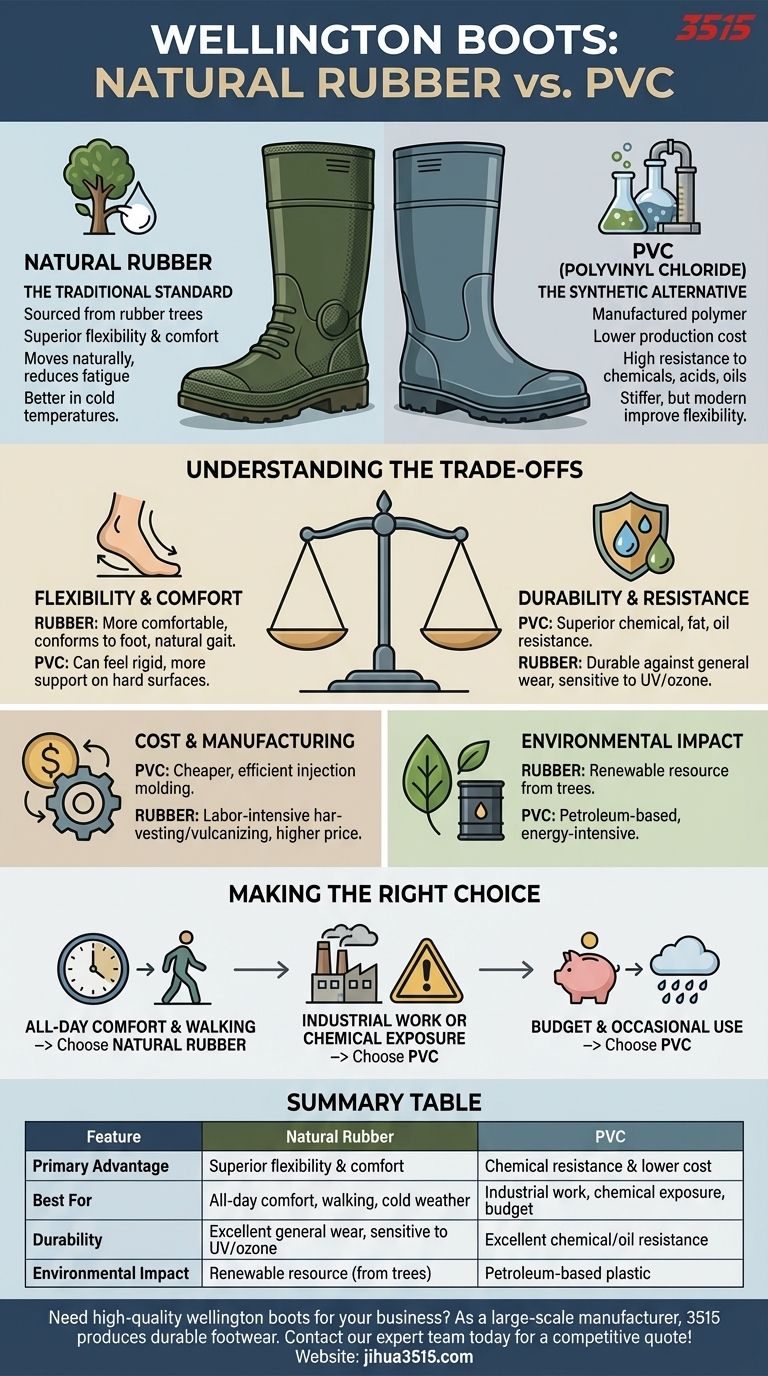
Related Products
- Safety Footwear Wholesale Manufacturer for Custom OEM/ODM Production
- Premium Flame-Retardant Waterproof Safety Boots and Shoes
- Factory-Direct Wholesale Canvas Boots with High-Traction Rubber Soles
- Wholesale Waterproof Tactical Boots Custom Suede & High-Traction Soles
- Wholesale Safety Footwear Manufacturer for Bulk & Custom OEM Orders
People Also Ask
- What are the pros and cons of wellington boots? A Guide to Waterproof Footwear Choices
- Can Wellington boots be worn in cold weather? Yes, if you choose the right insulated type.
- What temporary solutions were mentioned for using less supportive footwear like wellies? Protect Your Feet Now
- What are the benefits of natural rubber in Wellington boots? Superior Comfort, Durability & Grip
- Are wellies harmful to toddlers' feet? A Guide to Safe & Healthy Footwear
- What is the significance of understanding the materials used in wellington boots? Choose the Right Boot for Your Needs
- How does neoprene enhance the performance of Wellington boots? Superior Warmth & Comfort in Cold Conditions
- How did Wellington boots evolve during World War I? From Aristocratic Fashion to Military Necessity

















